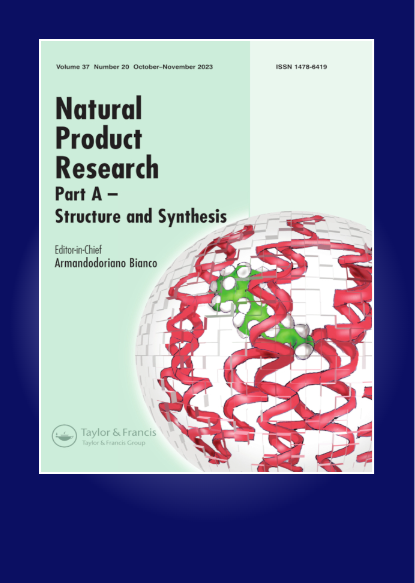巴豆急性口服毒性、抗肿瘤、抗菌和抗氧化活性的GC-MS分析与评价。航空部件:体外、体内和计算机研究。
IF 1.9
3区 化学
Q3 CHEMISTRY, APPLIED
引用次数: 0
摘要
牛膝草;灌木在亚洲传统上被广泛用作抗感染药。该研究旨在进行代谢物分析、口服急性毒性和抗氧化研究、抗菌活性和对人肝癌(HepG2)、乳腺癌(MCF-7)和横纹肌肉瘤(RD)细胞的抗癌作用。经气相色谱-质谱分析,共鉴定出39种化合物,主要包括脂肪酸(57.76%)、倍半萜(24.56%)和三萜(9.54%)。正己烷部分对HepG2、MCF-7和RD细胞具有较强的抗肿瘤作用,IC50值分别为3.4、6.5和7.1 μg/mL。组织学检查显示明显的形态学改变与凋亡作用机制的变化一致。分子对接研究揭示了所鉴定化合物与磷酸肌肽3-激酶和聚(adp -核糖)聚合酶-1酶的合理结合模式。我们的研究结果表明,socotranus可能是一种有价值的抗菌和抗癌药物来源。本文章由计算机程序翻译,如有差异,请以英文原文为准。
GC-MS profiling and evaluation of acute oral toxicity, anti-tumour, antimicrobial and antioxidant activities of Croton socotranus Balf.f. aerial parts: in-vitro, in-vivo and in-silico studies
Croton socotranus Balf.f. shrub is widely used traditionally in Asia as an anti-infective. The study was conducted for metabolite profiling, oral acute toxicity and antioxidant studies, antimicrobial activity and anticancer effect against human hepatoma (HepG2), breast cancer (MCF-7) and rhabdomyosarcoma (RD) cells. Gas chromatography-mass spectrometry analysis revealed the presence of 39 compounds, predominantly comprising fatty acids (57.76%), sesquiterpenes (24.56%) and triterpenes (9.54%). The n-hexane fraction exhibited promising antimicrobial activity and displayed a potent anti-tumour effect against HepG2, MCF-7 and RD cells with IC50 values of 3.4, 6.5 and 7.1 μg/mL, respectively. Histological examination revealed significant morphological changes consistent with the changes observed in the apoptotic mechanism of action. The molecular docking study provided insights into the rational binding modes of the identified compounds with phosphoinositide 3-kinase and poly(ADP-ribose)polymerase-1 enzymes. Our findings suggest the potential of C. socotranus as a valuable source of antimicrobial and anticancer agents.
求助全文
通过发布文献求助,成功后即可免费获取论文全文。
去求助
来源期刊

Natural Product Research
化学-医药化学
CiteScore
5.10
自引率
9.10%
发文量
605
审稿时长
2.1 months
期刊介绍:
The aim of Natural Product Research is to publish important contributions in the field of natural product chemistry. The journal covers all aspects of research in the chemistry and biochemistry of naturally occurring compounds.
The communications include coverage of work on natural substances of land and sea and of plants, microbes and animals. Discussions of structure elucidation, synthesis and experimental biosynthesis of natural products as well as developments of methods in these areas are welcomed in the journal. Finally, research papers in fields on the chemistry-biology boundary, eg. fermentation chemistry, plant tissue culture investigations etc., are accepted into the journal.
Natural Product Research issues will be subtitled either ""Part A - Synthesis and Structure"" or ""Part B - Bioactive Natural Products"". for details on this , see the forthcoming articles section.
All manuscript submissions are subject to initial appraisal by the Editor, and, if found suitable for further consideration, to peer review by independent, anonymous expert referees. All peer review is single blind and submission is online via ScholarOne Manuscripts.
 求助内容:
求助内容: 应助结果提醒方式:
应助结果提醒方式:


